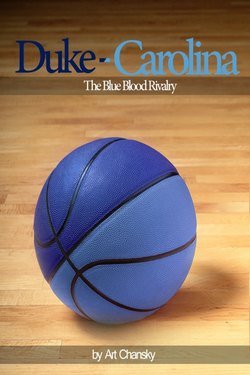Читать книгу Duke - Carolina - Art PhD Chansky - Страница 3
SECTION I — ’BASKET BALL’ AT BOTH SCHOOLS
ОглавлениеThere are several oddities about the beginnings of Duke-Carolina Basketball, which grew into the greatest rivalry in the college game and perhaps all of sports.
Or maybe those oddities aren’t that odd, after all.
Duke began basketball in 1906, a full five years before UNC started the sport on the varsity level. The nation’s first state- supported university opened its doors in 1795 but educated students for nearly 100 years before forming any kind of intercollegiate athletics program.
And, even though what was once called Normal College, then became Trinity, had relocated from Randolph County to Durham only eight miles from Chapel Hill in 1892, the schools did not play each other in basketball until 1920.
The culprit here was king football.
They both began football in 1888, and Trinity defeated UNC 16-0 on November 27 in the first college football game played below the Mason Dixon line. They both had nice little teams for a few years, playing only two or three games and, like today, meeting in November. In fact, the 1889 game remains listed as a forfeited victory in the respective Duke and UNC record books because each school thought it was hosting the other on its campus — and both teams stayed home.
19th Century Trinity-UNC Game Program
In the next few years, Trinity became a powerhouse, claiming the unofficial championship of the South after its 1891 team beat UNC, Virginia and Furman by a combined score of 122-4. Before 1892, Trinity had won the two games that had been played against the Tar Heels and was apparently happy with how things were going. Not UNC, which expanded its schedule to six, then seven, then nine games and its “Wonder Team” twice beat the stuffing out of the Trinity Eleven (24-0, 28-0) in 1892 and ’94. The Trinity faculty had been agitating for the elimination of football for several years when the abolition movement received a major push from the Western North Carolina Conference of the Methodist Church. At the time, the organization provided a significant portion of Trinity’s income, but in 1894 the Board voted to withhold any more contributions to Trinity until it gave up football. Almost immediately, the school’s faculty voted to ban the sport — despite protests from football-crazy students.
Trinity would not play another football game for 26 years—a victim of the growing disgust with its brutality that almost killed the sport it in its infancy (until Teddy Roosevelt pushed for the formation of the NCAA and adoption of new rules to open up the game). An 1893 editorial in the Duke Archive described football as “a brutal, ungentlemanly immoral game ... one that encourages indolence and vice.” And THAT was written by an anonymous author who was defending the game! Today’s Duke media guide still says “Football was banned (from 1895-1919) by the Board of Trustees as too dangerous physically and it distracts from academics.” But Trinity’s opposition to football went beyond a general disgust with the sport. To justify banning the popular game, officials complained about growing professionalism in football, especially at the University of North Carolina, then enjoying its first great era of gridiron success.
Football Was "Brutal" Unsafe Game in 1800s
UNC officials didn’t appreciate such charges and their response was a gradual breakdown in all athletic relations between the two schools. The annual baseball rivalry between UNC and Trinity — which might have been the biggest intercollegiate athletic event in the state in the 19th Century — was suspended after 1898. The two schools occasionally met in tennis or competed in the same multi- team track meets, but for more than two decades Trinity and UNC did not compete in the sports that really mattered — football, baseball and the new game of basketball. More than 20 years of bad blue blood ensued. Despite those measly eight miles, Trinity and UNC had little to do with each other because those football Tar Heels remained “a bunch of pros” as far as the more studious men of Trinity were concerned. What else would you expect from a Methodist college whose motto was “Eruditio et Religio,” meaning “Knowledge and Religion.”
